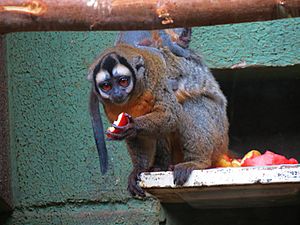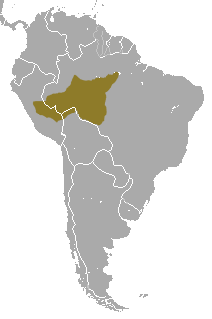Black-headed night monkey facts for kids
Quick facts for kids Black-headed night monkey |
|
|---|---|
 |
|
| Conservation status | |
| Scientific classification |
|
| Kingdom: | Animalia |
| Phylum: | Chordata |
| Class: | Mammalia |
| Order: | Primates |
| Suborder: | Haplorhini |
| Infraorder: | Simiiformes |
| Family: | Aotidae |
| Genus: | Aotus |
| Species: |
A. nigriceps
|
| Binomial name | |
| Aotus nigriceps (Dollman, 1909)
|
|
 |
|
| Black-headed night monkey range | |
| Script error: The function "autoWithCaption" does not exist. | |
Script error: No such module "Check for conflicting parameters".
The black-headed night monkey (Aotus nigriceps) is a small, furry night monkey from South America. These monkeys are found in countries like Brazil, Bolivia, and Peru. They are about the size of a small squirrel.
What They Look Like
Black-headed night monkeys have small ears. Their fur often hides these ears. When they grow up, they weigh about 750 grams. This is about the same as a small pineapple. They usually reach this size around 14 months old.
These monkeys have three black stripes on their forehead. These stripes meet in the middle. They also have white patches. You can see these patches around their eyes, on their cheeks, and under their mouth. Their eyes are very large and brown. These big eyes help them see well in the dark.
Where They Live
Black-headed night monkeys live in parts of Brazil, Bolivia, and Peru. In Peru, they have been seen living in areas that have changed. These areas might have been changed by people or by natural events. This shows they can adapt to different places.
Family Life
Black-headed night monkeys live in small family groups. A newborn monkey is very tiny. It usually weighs about 90 to 150 grams. This is like a small apple.
Male monkeys can have babies when they are about 2 years old. Female monkeys are ready to have babies around 3 or 4 years old. Females usually give birth to one baby each year. This happens between August and February.
The male monkeys are the main caregivers for the babies. They do most of the looking after. When the baby is about 2 weeks old, the mother might gently nudge its feet or tail. This encourages the baby to go with the father. By 8 weeks, the babies start to become more independent.
Behavior
These monkeys live in small family groups. Sometimes, male monkeys will fight with other males. Female monkeys will also fight with other females. These fights can last from 5 to 30 minutes.
They fight mainly to protect their home area, called their territory. The group that wins the fight gets to keep the territory. They also get to keep any young monkeys from the losing group.
What They Eat
Black-headed night monkeys mostly eat fruit. This means they are frugivorous. Besides fruit, they also eat other things. Their diet includes leaves and flowers. They also like to eat insects such as moths and beetles. Spiders are another part of their diet.
Names
In the Kwaza language of Rondônia, Brazil, this monkey is called ausisiti. In the Shawi language of Peru, it is known as nu’nu’.
See also
 In Spanish: Mico nocturno de cabeza negra para niños
In Spanish: Mico nocturno de cabeza negra para niños
 | Jessica Watkins |
 | Robert Henry Lawrence Jr. |
 | Mae Jemison |
 | Sian Proctor |
 | Guion Bluford |


